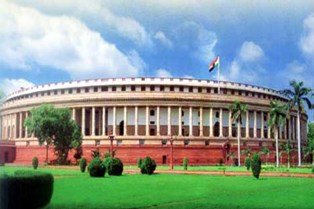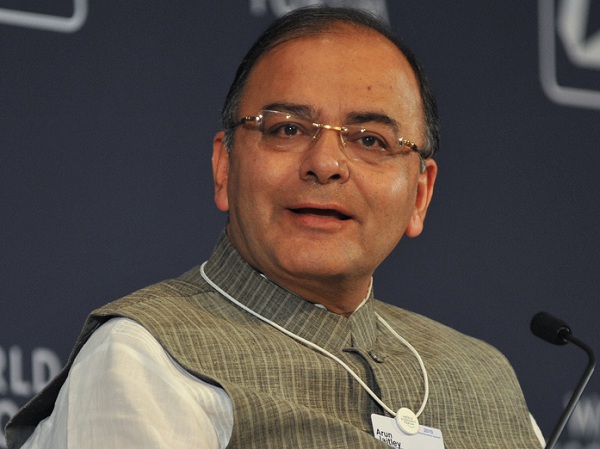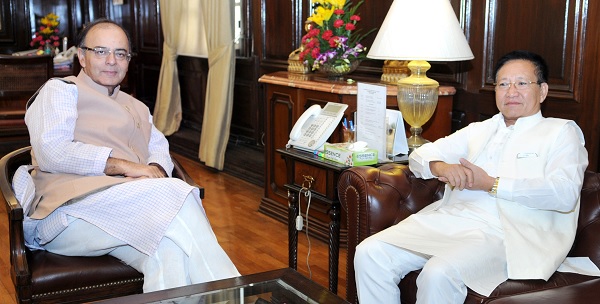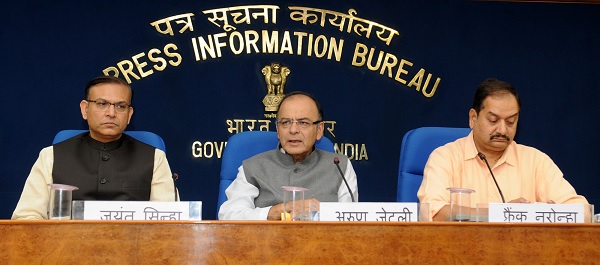
by admin | May 25, 2021 | Banking, Corporate, Corporate finance, News
 New Delhi:(IANS) Finance Minister Arun Jaitley will on Monday table in parliament the Insolvency and Bankruptcy Bill, the biggest reform proposal after the Goods and Services Tax (GST) bill, the government said.
New Delhi:(IANS) Finance Minister Arun Jaitley will on Monday table in parliament the Insolvency and Bankruptcy Bill, the biggest reform proposal after the Goods and Services Tax (GST) bill, the government said.
“Fin Minister will introduce Insolvency and Bankruptcy Bill in Parliament tomorrow. Next GST, it’s the biggest reform (sic),” tweeted Shaktikanta Das, secretary in the Department of Economic Affairs, on Sunday.
The government intends to bring important legislative measures on structural reforms during the remaining three days left of parliament’s winter session, notwithstanding the setback on the GST Bill, Jaitley had said on Saturday.
The proposed Bankruptcy Code aims to reduce delays in resolution of insolvency cases and improve recoveries of amount lent to companies. The draft bill has proposed a timeline of 180 days, extendable by another 90 days, to resolve cases of bankruptcy.
The new Bankruptcy Code will help India in the World Bank’s ease of doing business ranking, as per a key criterion set by the multilateral lender.
“Govt remains committed to medium-term fiscal targets,” Shaktikanta Das said in another tweet.
Sharply revising downwards the projected gross domestic product (GDP) growth for this fiscal by one percent to the 7-7.5 percent range, the government on Friday said the decline in nominal GDP growth will create challenges for meeting the current fiscal deficit target of 3.9 percent of GDP.
“Slower than anticipated nominal GDP growth will itself raise the deficit target by 0.2 per cent of GDP,” the finance ministry said in its Mid-year Economic Review tabled in parliament.
“The anticipated shortfall in disinvestment receipts, owing to adverse market conditions for a portfolio that largely comprises commodity stocks, will add to the challenge,” it said.
At an all-party meeting held by Rajya Sabha chairman Hamid Ansari on Friday, the opposition, after weeks of confrontation on various issues, agreed to the passage of certain bills in the Rajya Sabha during the last week of the session, but consensus was elusive on the GST bill.
“However, GDP growth has been powered only by private consumption and public investment is a concern. The proposed wage hike for government workers may impact plan for next fiscal,” the report said.
Jaitley, in his February budget, had extended the target deadline for controlling fiscal deficit to three percent, reasoning that insistence on a timetable to contain the deficit would harm growth prospects.
The targets for the next three years have been set at 3.9 percent for 2015-16, 3.5 percent for 2016-17, and 3.0 percent for 2017-18.
India’s fiscal deficit has touched 74 percent of the annual target as on end-October, even as tax revenue is below the half-way mark, as per the latest official estimates of the central government accounts released late last month.

by admin | May 25, 2021 | Investing
 Hong Kong:(IANS) India is currently a better investment prospect than many other countries, Finance Minister Arun Jaitley said here on Sunday.
Hong Kong:(IANS) India is currently a better investment prospect than many other countries, Finance Minister Arun Jaitley said here on Sunday.
“India will give better returns than many other countries,” Jaitley, who is on a two-day visit to Hong Kong, said at a meeting with investors and business leaders.
He said foreign investment could give great additional resources, and the country’s infrastructure sector required major investment.
“Railways, highways and power sectors are among those that require funds, and the success in these areas would largely depend on bankability.
“Special focus is being given on improving the ease of doing business. Investors have felt in the past that the procedures have been difficult in India,” the minister added.
Noting that stalled projects had impacted the balance sheets of private companies in India, Jaitley said the proposed national investment and infrastructure fund would be a “great enabler” to attract investment, as well as help repair the balance sheets of affected firms.
The fund would be independent of the government, and operate just as another investor, he said.
The minister said some states were not charging adequate tariff for electricity, as a result of which the health of power distribution companies (discoms) was being affected.
“These states cannot expect the PSU (public sector undertaking) banks to fund the deficit of discoms,” Jaitley said.
At a question-answer session after his address at the Singapore Summit on Friday, Jaitley had said India’s current power supply woes were not a result of production, of which there was a surplus last year, but because of discoms’ financial situation did not allow them to buy power.
“States where discoms are stressed…they have to reform, also by charging market prices for power,” he said.
Jaitley will address investors at the Capital Markets and Institutional Investors’ Summit organised by the Asia Pacific Investors Cooperation on Monday.
The summit will present to select Asian institutional investors the developments in India’s capital markets and investment opportunities.
Jaitley will also hold meetings with the Hong Kong Trade Development Council and Greater China Chamber of Commerce. He will attend small group meetings with financial sector investors and fund managers in Hong Kong.
He will be meeting the chief executive of Hong Kong on Monday and address an event organised by the Indian community in Hong Kong.

by admin | May 25, 2021 | Corporate, Corporate finance, Economy, News

Chief Minister of Nagaland,T.R. Zeliang meeting on the Union Minister for Finance, Corporate Affairs and Information & Broadcasting,Arun Jaitley, in New Delhi
New Delhi:(IANS) Given the worries plaguing the global economy, India will ensure that fundamentals at its own end remain strong to attract capital with resolution soon on all tax disputes, and framing of a new bankruptcy code and an updated procurement law, Finance Minister Arun Jaitley said on Thursday.
“In such a situation where there is turmoil almost by the day in global markets, we are trying to make the fundamentals of our own economy strong, and our ability to resist these changes can substantially improve,” Jaitley said, ahead of the monetary policy update in the US.
“Without investment, there is going to be no additional economic activity,” he said at the India Economic Convention, organised here by the Federation of Indian Chambers of Commerce and Industry (Ficci) and attended by ministers, the who’s who of India Inc. and key policymakers.
The finance minister’s remarks came just ahead of the meeting of the Federal Open Market Committee, an arm of the US central bank, set to review later Thursday the country’s interest rate regime, which the global financial markets, including India, have been watching very keenly.
The fear is that if there is a hike in interest rates — for the first time since 2006 — there could be a flight of capital away from emerging market economies such as India towards the US, since investments there would become more attractive.
Jaitley said that with the stated objective on ease of doing business, all tax disputes will be put to rest over the next few days, and added that this was a “work in progress” along with steps to make it easier to do business in India.
“Since May 2014, a number of tax disputes have been put to rest since the Bharatiya Janata Party government took office,” the finance minister said alluding to the issue of retrospective tax on capital gains which has been much criticised, notably by overseas investors and funds.
“We are trying over the next few days itself (to look at pending disputes) so that many others can be put to sleep — either by a judicial resolution or some executive resolution.”
Speaking about economic reforms, Jaitley said that while the goods and services tax regime was stuck because of political reasons, the government was taking other steps, like putting in place a new bankruptcy code, fast-track arbitration norms, and a revamped public procurement law.
This apart, hiring norms for banks were being recast and their balance sheets recapitalised to make them financially stronger. The stressed assets of companies in infrastructure, steel and power distribution were also being dealt with.
These steps, he said, were key to fetching investment.
“Any architecture of Indian growth — along with private investment, public investment when it picks up, and foreign direct investment — will need a lot of resource diversion to skill India and make these people in unorganised sector also to start generating jobs,” he said.
“Kick-starting our manufacturing sector and improving its growth rate further, I think, is one of the greatest challenges to the Indian economy. We have now decided that within the area of growth architecture, we must first concentrate on agriculture.”

by admin | May 25, 2021 | Corporate, Corporate Governance, Economy, News

Union Minister for Finance, Corporate Affairs and Information & Broadcasting, Arun Jaitley addressing a press conference, in New Delhi. The Minister of State for Finance, Jayant Sinha and the Director General (M&C), Press Information Bureau, A.P. Frank Noronha are also seen.
New Delhi:(IANS) Describing India as transiently impacted by recent events in China, Finance Minister Arun Jaitley on Tuesday said the global situation instead presented an opportunity for the country as it is a net importer of commodities and oil is in free fall.
“India is one of the lesser impacted economies (by China devaluation, slowdown), partly because our own fundamentals are reasonably strong,” Jaitley said while briefing reporters on Prime Minister Narendra Modi’s meeting here with union ministers, corporate heads and economists to discuss the global markets’ turmoil sparked off by the Chinese economic slowdown and attendant opportunities for India.
“The main thrust of the meeting was that since India is relatively touched little except for a transient impact on the markets, it should therefore strengthen its domestic economy so that the larger benefits of the global economy may come India’s way,” he said.
“Being a net importer of commodities globally, the low oil prices are an opportunity for us,” the finance minister added.
Global crude oil in free fall touched the $40-a-barrel mark in trading late in August, having already dropped under $50 for the second time this year from the level of over $100 last year.
The meeting, that lasted over three hours, discussed the global situation that impacted India economically like a possible hike in the US Federal Reserve rate, the world powers’ nuclear deal with Iran contributing partly to cheaper oil and the way the Chinese slowdown opens up opportunities.
A slowdown in the Chinese markets, which led to global markets’ crash, coupled with rupee volatility and the risk of a US rate hike, knocked out the Indian equity markets in August.
Reserve Bank Governor Raghuram Rajan, NITI Aayog Vice Chairman Arvind Panagariya, Chief Economic Advisor Arvind Subramanian and Aayog member Bibek Debroy also attended the meeting on ‘Recent Global Events: Opportunities for India’.
Apart from heads of industry chambers, top industrialists such as Reliance Industries’ Mukesh Ambani, Aditya Birla Group head Kumar Mangalam Birla, Adani group chairman Gautam Adani, Tata group chief Cyrus Mistry, Wipro chief Azim Premji, Sun Pharma CMD Dilip Sanghvi, ITC’s Y.C. Deveshwar and Infrastructure Leasing and Financial Services Limited chairman Ravi Parthasarathy were among those who attended.
“The general consensus was that growth of emerging economies is all slowing down, except that we (India) are growing at seven percent. So how can we take advantage of this opportunity (of slowdown elsewhere),” Confederation of Indian Industry president Sumit Mazumdar told reporters after the meeting.
“The prime minister said this is an opportunity for us to take advantage of and invest. Cost of capital is too high but I don’t know how many people can go ahead to take risk and invest… many of us raised the issue of interest rate,” said Federation of Indian Chambers of Commerce and Industry (Ficci) president Jyotsna Suri.

 New Delhi:(IANS) Finance Minister Arun Jaitley will on Monday table in parliament the Insolvency and Bankruptcy Bill, the biggest reform proposal after the Goods and Services Tax (GST) bill, the government said.
New Delhi:(IANS) Finance Minister Arun Jaitley will on Monday table in parliament the Insolvency and Bankruptcy Bill, the biggest reform proposal after the Goods and Services Tax (GST) bill, the government said.


